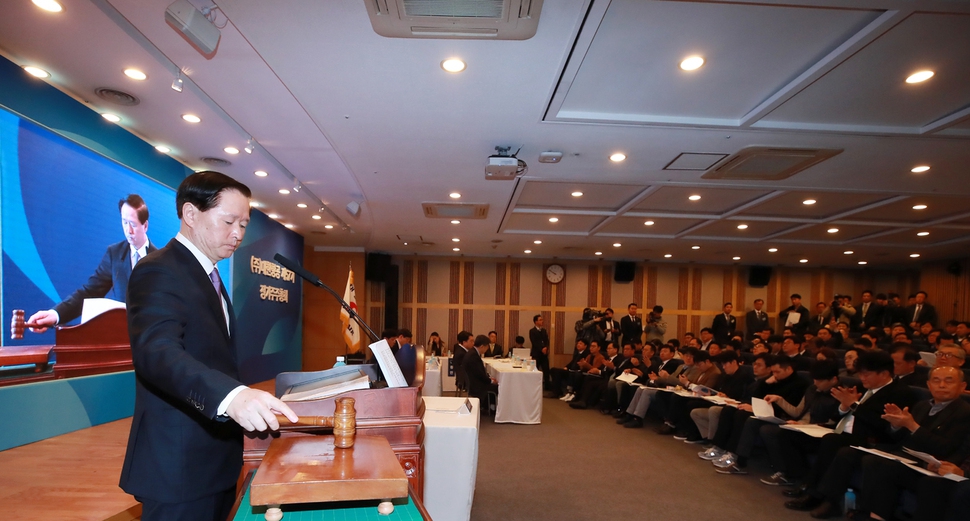 |
|
Woo Ki-hong, chair of the Korean Air general shareholders meeting on Mar. 27, announces that Chairman Cho Yang-ho will not be reappointed as an inside director. (photo pool)
|
2019 may be a major point for change in South Korean capital market
A new era of shareholder activism has officially dawned. The signal flare came with the move by the National Pension Service (NPS) to use its shareholder authority to block the reappointment of Hanjin Group chairman Cho Yang-ho as an inside director at Korean Air. The emergence of stewardship code activities and domestic shareholder activist funds on the capital market has observers predicting many changes ahead, including governance structure improvements beginning this year for other companies outside the Hanjin Group. “From a long-term perspective, we see this year as a starting point for major change. Even last year, there weren’t many shareholder proposals at all; this year, they’ve increased enormously,” said Value Partners Asset Management President Kim Bong-ki on Mar. 28. “While the activities of minority shareholders this year may not be enough to change outside directors or articles of associations, it may become possible next year as stewardship code activities increase,” Kim predicted. The term “shareholder activism” refers to an approach to investment in which shareholders become actively involved in management to promote in increase in the value of a company and their stake in it. Shareholder activism is already becoming a worldwide trend. Globally, activist funds totaled some US$125.6 billion in 2017, an increase of 147% from US$50.9 billion in 2011. The US investment bank JPMorgan counted 651 cases worldwide of activist funds pursuing corporate governance structure improvements or opposing director appointments last year. In the past, shareholder activism in South Korea has been relatively minor. The percentage of activist fund activities in Asia between 2011 and 2017 totaled 6% for South Korea – less than Japan (32%), Hong Kong (24%), or China (10%). “In South Korea, activist funds have had a strongly negative image, with associations of foreign funds hijacking domestic companies,” explained Shinhan Investment Corp. analyst Kim Sang-ho. “Activist funds have had difficulty getting public support even when they’ve raised issues about irrational corporation practices, and it has generally been an unfavorable environment institutionally for foreign investors and other minority shareholders to adopt an activist approach,” Kim observed. Governance structures haven’t improved for three straight years In the meantime, governance structures at South Korea’s companies have failed to improve. Study results published by the Asian Corporate Governance Association (ACGA) showed South Korea ranking ninth for three straight years between 2016 to 2018, placing it below Japan (seventh), Thailand (sixth), and India (seventh). The situation has left the NPS and other institutional investors asking serious questions. In particular, the end of the South Korean economy’s period of accelerated growth means they can no longer count on an era where the corporations they invest in return high profits without the investors taking any action on their own. They’ve also been exposed to the risk of plummeting rates of returns on their assets, as the public image of companies like Korean Air have suddenly taken a severe hit over high-profile incidents of bad behavior by members of the chairman’s family appointed to executive positions without any scrutiny of their management capabilities. Practices like funneling mean that corporation profits are often siphoned off by the chairman’s family rather than returned to shareholders. To preserve their customers’ post-retirement funds, the institutions are now faced with either having to press the companies they invest in to increase their dividends or push companies with tarnished value to take steps to address problem areas. It was in this context that the “stewardship code” approach was adopted. Stewardship codes have had the effect of shaking domestic shareholder activism out of its slumber. KCGI, a fund headed by corporate governance structure expert Kang Sung-bu that locked horns with Cho Yang-ho over his appointment as inside director during a Hanjin KAL shareholders’ meeting on Mar. 29, is looking to the NPS for supporting fire. In a report titled “The Potential Butterfly Effect from Stewardship Code Adoption,” Hana Financial Investment analyst Oh Jin-won noted, “The scale of shareholder activism and other forms of responsible investment has increased sharply in Japan, which was earlier to adopt stewardship codes.” In South Korea, Korea Investment Value Asset Management and Lime Asset Management are considering following the lead of Value Partners Asset Management in launching activist mutual funds. Also available are activist forms of public offering fund in which so-called “ant investors” can enroll. “The public offering fund market itself isn’t great, but as they’ve introduced the various stewardship code activities, the sales points have said it’s become a lot easier to explain products to customers,” said KB Asset Management manager Jeong Yong-hyeon, who manages the Shareholder Value Focus Fund. Limited power of minority shareholders Unfortunately, the capital market is such that minority shareholders can do very little to rein in the majority shareholders. South Korean President Moon Jae-in’s campaign pledges to strengthen minority shareholder rights with the adoption of concentrated voting systems and separate auditing committee elections have yet to come to pass. An amendment to the Capital Markets intended to grow and diversify the industry by loosening conditions including 10% management participation at private equity funds and a 10% ownership minimum for voting rights at hedge funds remains tied up in the National Assembly. “There’s no momentum because the opposition hasn’t shown a readiness to review the legislation. It may get discussed in the legislative review subcommittee in April,” said a source from the office of Democratic Party lawmaker Kim Byung-wook. Another area mentioned as needing work is increased independence for private management companies – including the ones at the Korean Air shareholders’ meeting who supported Cho Yang-ho’s reappointment despite the recommendations of a voting right advisory agency to vote against it. By Lee Wan, staff reporter Please direct comments or questions to [english@hani.co.kr]






